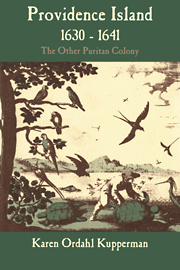Book contents
- Frontmatter
- Contents
- List of Maps
- Preface
- Author's Note
- 1 The Providence Island Company and Its Colony: The Program
- 2 Founding a Colony on Providence Island
- 3 Contested Authority: The Governorship of Captain Philip Bell
- 4 Frustrated Hopes for Economic Development
- 5 Land and Society: The Middling Planters
- 6 Servants into Slaves
- 7 Military Requirements and the People's Response
- 8 The Turbulent Religious Life of Providence Island
- 9 Governing Puritan Privateers: The Governorships of Robert Hunt and Nathaniel Butler
- 10 The Business History of the Providence Island Company
- 11 The End and Persistence of Providence Island
- Appendixes
- Bibliographical Essay
- Index
4 - Frustrated Hopes for Economic Development
Published online by Cambridge University Press: 24 November 2009
- Frontmatter
- Contents
- List of Maps
- Preface
- Author's Note
- 1 The Providence Island Company and Its Colony: The Program
- 2 Founding a Colony on Providence Island
- 3 Contested Authority: The Governorship of Captain Philip Bell
- 4 Frustrated Hopes for Economic Development
- 5 Land and Society: The Middling Planters
- 6 Servants into Slaves
- 7 Military Requirements and the People's Response
- 8 The Turbulent Religious Life of Providence Island
- 9 Governing Puritan Privateers: The Governorships of Robert Hunt and Nathaniel Butler
- 10 The Business History of the Providence Island Company
- 11 The End and Persistence of Providence Island
- Appendixes
- Bibliographical Essay
- Index
Summary
COLONIES WERE VASTLY EXPENSIVE ENTERPRISES, always soaking up sums far greater than the original investors ever imagined. Plantations were begun in exaggerated hopes of rich commodities; expectations of fabulous returns were particularly elevated in the case of southern regions. The correspondence between planters in the early English colonies and their backers in England always took on a semihysterical tone in consequence, as the investors urged the settlers to send them products of value, and quickly. Planters were caught in a classic bind: They praised the richness and fertility of their land to keep backers committed to the project; but when the promised products failed to appear and adventurers' costs mounted alarmingly, recriminations against the settlers inevitably followed.
Much of the mythology of development focused on the engendering power of heat. Not only rich crops but minerals as well were thought to be generated by the sun's rays in the hot regions of the earth. Minerals such as gold and silver were thought to grow or form in the earth and then to be drawn to the surface by the magnetic power of the sun. Moreover, analysts argued that hot climates were most fruitful and the crops produced in them most rich; the “Sun with his masculine force” fructified the “teeming” feminine earth.
Many writers whose credibility was fortified by firsthand experience argued that lucrative trades could be set up with southern regions almost from the very beginning of plantation. For example, Robert Harcourt, whose experience in Guiana dated back to 1609, wrote A Relation of a voyage to Guiana (London, 1613), which was republished in 1626.
- Type
- Chapter
- Information
- Providence Island, 1630–1641The Other Puritan Colony, pp. 81 - 117Publisher: Cambridge University PressPrint publication year: 1993



